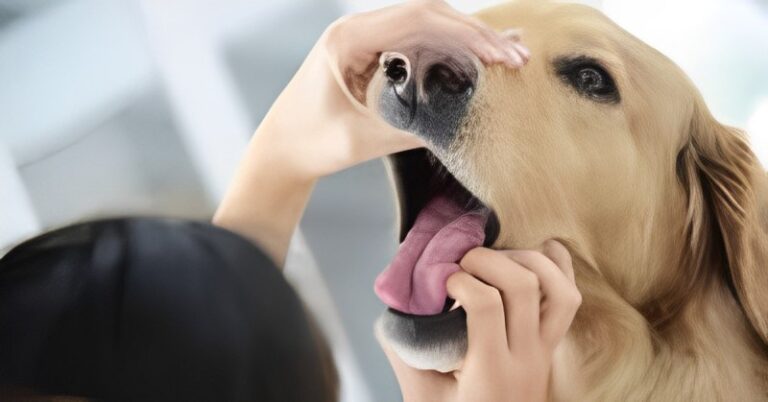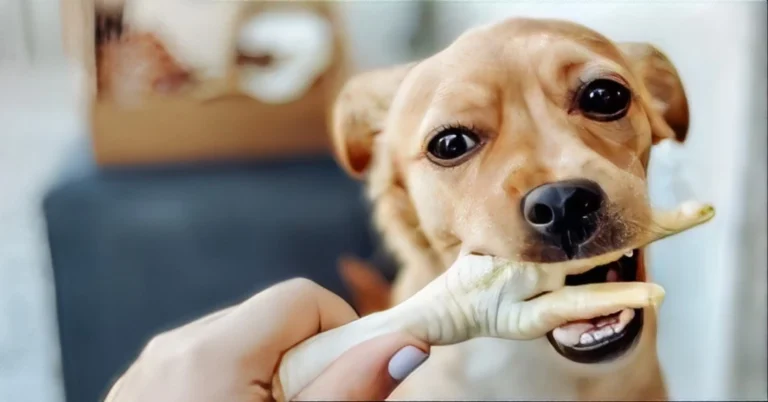Can Dogs Eat Guava?: Benefits, Risks, Nutrients Facts
“Can dogs eat guava?” is a common question among pet owners, While guava can be a healthy treat for dogs in moderation, there are some important considerations to keep in mind.
Guava is rich in essential nutrients like vitamin C, fiber, and antioxidants, which can benefit your dog’s health.
However, it’s crucial to remove the seeds and peel before feeding guava to your dog, as they can pose a choking hazard and may be difficult for dogs to digest.
Additionally, guava should only be given as an occasional treat, as feeding too much can lead to digestive upset.
Here’s a table outlining the nutrient facts of guava for dogs:
| Nutrient | Amount per 100g |
| Calories | 68 |
| Protein | 2.6g |
| Carbohydrates | 14g |
| Fiber | 5.4g |
| Vitamin C | 228mg |
| Vitamin A | 624IU |
| Folate | 49mcg |
| Potassium | 417mg |
Guava is a nutritious fruit for dogs, providing a good source of vitamin C, fiber, and other essential nutrients. However, it should be fed in moderation to prevent digestive upset and other potential issues.
Key benefits and risks of feeding guava to dogs
Feeding guava to dogs can offer several health benefits, but it also comes with some risks that pet owners should be aware of. Here are the key benefits and risks of feeding guava to dogs:

Benefits:
Rich in Vitamin C:
Can dogs eat guava? Obviously, guava is a great source of vitamin C, which can help boost your dog’s immune system and protect against illness.
High in Fiber:
Guava is high in fiber, which can aid in digestion and help regulate bowel movements in dogs.
Antioxidant Properties:
Basically, Guava contains antioxidants that can help reduce inflammation and protect your dog’s cells from damage.
Low in Calories:
Guava is a low-calorie fruit, making it a healthy and nutritious treat option for dogs watching their weight.
Risks:
Choking Hazard:
Guava seeds can pose a choking hazard for dogs, so it’s important to remove them before feeding guava to your pet.
Digestive Upset:
Feeding too much guava to your dog can lead to digestive upset, including diarrhea and stomach pain.
Allergic Reactions:
Some dogs may be allergic to guava, so it’s essential to monitor your pet for any signs of an allergic reaction, such as itching, swelling, or difficulty breathing.
Sugar Content:
Guava is naturally sweet and contains sugar, so it should be fed in moderation, especially to dogs with diabetes or weight issues.
While dogs eat guava can be a healthy and nutritious treat for dogs, it’s important to feed it in moderation and remove the seeds to reduce the risk of choking and digestive upset. If you’re unsure whether guava is suitable for your dog, consult with your veterinarian before adding it to your pet’s diet.
How to Safely Feed Guava to Dogs
Certainly, to safely feed guava to your dog, follow these guidelines:

Remove Seeds and Peel:
Before feeding guava to your dog, make sure to remove the seeds and peel. The seeds can pose a choking hazard, and the peel may be difficult for dogs to digest.
Cut into Small Pieces:
Cut the guava into small, bite-sized pieces to make it easier for your dog to eat and digest.
Feed in Moderation:
Guava should be fed to dogs in moderation. While it offers health benefits, too much can lead to digestive upset.
Monitor for Allergic Reactions:
Keep an eye on your dog after feeding guava for any signs of an allergic reaction, such as itching, swelling, or difficulty breathing. If you notice any of these symptoms, stop feeding guava and consult your veterinarian.
Consult with Your Vet:
If you’re unsure whether guava is suitable for your dog or how much to feed, consult with your veterinarian for personalized advice.
By following these tips, you can safely incorporate guava into your dog’s diet as an occasional treat.
Considerations When Preparing Guava for Dogs
Can dogs eat guava? While guava can be a special treat for your pet, there are factors to consider before adding the fruit to your dog’s diet.
Digestive Problems:
Guava fruit is high in fiber, which is beneficial in moderation but can lead to digestive issues like diarrhea or cramping if your dog overeats it.
Weight Gain:
Guava is naturally high in sugar. Overconsumption can lead to weight gain or obesity, so it’s essential to feed it in moderation.
To safely incorporate guava into your dog’s diet, ensure it’s given in moderation and prepared properly to avoid potential health risks.
Indications That Your Dog May Have a Guava Allergy
Signs that your dog might be allergic to guava include:

Itching and Skin Irritation:
Watch for excessive scratching, licking, or redness on your dog’s skin, which could indicate an allergic reaction.
Digestive Issues:
Diarrhea, vomiting, or other digestive problems after eating guava may indicate an allergy.
Swelling:
Look for swelling, especially around the face, muzzle, or eyes, which can be a sign of an allergic reaction.
Difficulty Breathing:
In severe cases, your dog may have difficulty breathing, which requires immediate veterinary attention.
If you notice any of these signs after feeding guava to your dog, stop feeding it immediately and consult your veterinarian for advice.
Alternatives to Guava for Dogs

There are several fruits and vegetables that can be healthy alternatives to guava for dogs:
Apples:
Remove the seeds and core, and slice apples into bite-sized pieces for a crunchy treat.
Bananas:
Rich in potassium, bananas are a sweet and easy-to-digest treat for dogs.
Blueberries:
Packed with antioxidants, blueberries are a great low-calorie snack for dogs.
Carrots:
Crunchy and high in fiber, carrots can be a satisfying snack for dogs that also promote dental health.
Watermelon:
In addition, remove the seeds and rind, and offer small amounts of fresh watermelon for a hydrating and refreshing treat.
Always introduce new foods to your dog’s diet slowly and in moderation to avoid digestive upset. If you’re unsure about any specific fruit or vegetable, consult with your veterinarian.
Fruits Dogs Should Avoid
Some fruits that dogs should avoid include:
Grapes and raisins:
These can cause kidney failure in dogs.
Cherries:
The pits contain cyanide, which is toxic to dogs.
Citrus fruits:
The oils and psoralens in citrus fruits can cause gastrointestinal issues in dogs.
Stone fruits:
Generally, Fruits with pits, like peaches and plums, can cause intestinal blockages if swallowed whole.
Fruit seeds/pits:
Apple seeds, cherry pits, and peach pits contain cyanide compounds that are toxic to dogs.
Fruit pits:
These can cause intestinal blockages if swallowed whole.
It’s always best to check with your veterinarian before introducing any new foods to your dog’s diet.
See also: Can dogs have Almond Butter
Frequently Asked Questions
For dogs, guava is harmless and non-toxic. Fiber, vitamin C, potassium, and magnesium are all abundant in this fruit.
It’s a unique fruit that is safe for dogs and gives your pet a tasty reward. Feel free to share some with your dog if you like; just be sure to take the seeds and skin off for your dog’s safety.
No matter the breed, age, or sex of the dog, grapes and raisins (dried grapes) have been shown to be extremely poisonous to dogs. In fact, grapes can cause acute, abrupt renal failure because of their extreme toxicity.
Always be aware of this potentially harmful fruit when around dogs, particularly if you have kids who like to eat raisins or grapes at home.
Because guava fruit has a high fiber content, overindulging in it may cause digestive issues for your dog, such as diarrhea or cramps. Weight gain may result from the high sugar content. The fruit has a high natural sugar content.
Indeed. When consumed in moderation, raw pineapple is a great snack for dogs. Conversely, canned pineapple need to be shunned.
Most dogs’ digestive systems cannot tolerate the excessive amount of sugar in fruit syrup found in canned goods.
Conclusion
In the final analysis, dogs eat guava can be good sign for your furry friend, but feed it in moderation and remove the seeds to prevent choking and digestive issues.
Rich in vitamin C, fiber, and antioxidants, guava offers health benefits. However, overfeeding can lead to digestive problems and weight gain due to its high sugar content.
Cut guava into small pieces, monitor for allergies, and consult your vet if unsure. Overall, guava can be a nutritious addition to your dog’s diet when fed safely.






